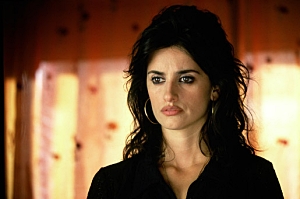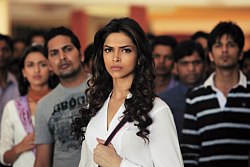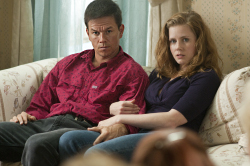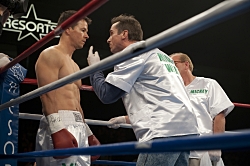Penelope Cruz is Raimunda
For all her success in Hollywood, Penelope Cruz would probably swap it all to be able to work with Pedro Almodovar on every film he made. While she began her career in earnest in 1992, scooping a Goya (the Spanish Oscar) for her sassy stretch in Bigas Luna’s Jamon Jamon, it was her brief turn giving birth on a bus in Almodovar’s 1997 film Live Flesh that first alerted international audiences to her work. She reunited with him two years later for a bigger role, as a pregnant nun with HIV, in All About My Mother. By this point, she had made her US debut in Stephen Frears’ The Hi-Lo Country, and was set to take the world by storm in a trio of movies – All The Pretty Horses, Blow and Captain Corelli’s Mandolin. Following these with Cameron Crowe’s experimental Vanilla Sky, a remake of Alejandro Amenabar’s 1997 film Open Your Eyes, which she also starred in, Cruz finally found herself in the enviable position of being able to work in both Europe and America. Therefore it was inevitable that she would once again work with Almodovar, this time in the lead in his latest film Volver. A role that won her – and the rest of the female cast – Best Actress at the 2006 Cannes Film Festival, Cruz plays Raimunda, the La Mancha-based mother of a teenage daughter haunted by the return of her own deceased mother.
Popular on LondonNet
Did it feel like a real honour that Pedro had written this role for you?
Yes. At the beginning, he said he was thinking about me for the role of the daughter – because it was seven years ago. And then he was writing, and he said, ‘Now I see you more as the lead character. You can play her’. When I read it, I thought it was the best script I’d ever read in my life.
Did you draw from your own mother to play the role?
Yes – from my mother, a lot of things. Her strength – she was very passionate about life and she would do anything for us. And she had to fight alone to raise us. We never had a lot of money for extras or anything. So I always saw my mother like Raimunda – working very hard. She didn’t have the problems that Raimunda had, fortunately. She wasn’t in that situation. But she had to work six days a week, and then she would do breakfast, lunch and dinner. She was a super-woman! For me, I don’t know how she did it with three kids.
But you must also have to multitask, just in a different way…
In a different way. I love my work, so maybe she couldn’t do what I do. When you love something…
Is it typical of Spanish women to be like Raimunda?
There are some women like this, but not everyone is like Raimunda. She is like a force of nature. But I know some of them.
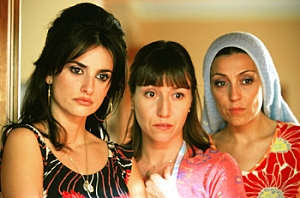 There are a lot of emotionally intense scenes in the movie. Was it tough for you?
There are a lot of emotionally intense scenes in the movie. Was it tough for you?
Yes, they required a level of concentration. When I was on the set, I was not talking on the phone or reading anything else. I was just reading things, listening to music and watching things that had to do with the state of the scene. So it would be a constant, maintaining for the whole day that state. If I had an hour off for lunch, I would put on a movie or something that would help me stay in that area. And at the end of the day, I was like a zombie. I would ride home and I hardly had the energy to eat with my eyes open. I would just go to sleep – it was a really exhausting experience.
Was it a different experience to your previous times working with Pedro?
Well, the role was bigger – and six months working together…she’s also a more demanding character. We rehearsed for three months and that was great.
Each time, he seems to give you a more complex character…
Yes, but even from the beginning in Live Flesh, it was a small character but it did so much for my career. I love that.
How does Pedro work during the rehearsals?
We do table work. With the script, we sit and we read the scenes, and he takes notes and changes or adapts some lines. He needs to hear us saying the words. It’s never very different, though, from how it starts out.
Your character is obviously influenced by Italian women from the 1950s – like Sophia Loren or Anna Magnani in Bellissima. What do you think of that?
I have seen those movies, but Pedro asked me to watch them again as homework to look at the energy of all those women from the Italian neo-realist films. A lot of them had those characters that represented motherhood. My character really represents that in this movie, so that was the reason for the character to have that physical aspect and that energy. It wasn’t gratuitous. For some reason, in the ’50s in Italy, the mother figure was very important – and my character needed to have that energy.
Does doing a film like this make you want to become a mother?
I wanted that before. All my life, since I was a little girl, I knew I wanted to have children. I love children. It has not changed. Also, with the three movies I have done with him I have been a mother. He kills me off in the other two – in this one I survive!
What do you think the main theme of the film is – female empowerment?
Yes. The men here, they disappear quickly. But there are reasons for that. I think Pedro has also written some beautiful characters for men in the past. Here the men make a lot of mistakes, then they are gone.
What do think Raimunda feels when she discovers her daughter has killed her stepfather?
I think she tries to protect her daughter, and she knows that her daughter just reacted on impulse at that moment. Raimunda recognizes that situation herself. She doesn’t even have to talk to her too much about it. She knows exactly what she felt.
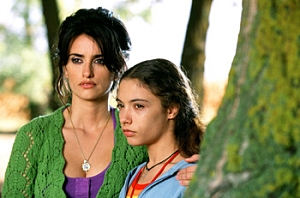 Why do you think you and Pedro are great partners on film?
Why do you think you and Pedro are great partners on film?
I don’t know. We have a great connection from the beginning. Even before I met him, it was so strange. I felt like I already knew him. I loved him even before I met him. It was so powerful. And when I looked at him in the eyes, this was the feeling that I knew I was going to have with him. It gets bigger and bigger every day. I adore him. It’s much more than working together. He’s a really special person in my life.
Pedro has written other scripts with you in mind?
He wrote another one where there is a part that he told me was for me, and I also like it very much. But now he is also writing another one, and he also told me about a part that I love. I think they will happen – but I don’t know which one or when. I know which one is more in his mind now but I don’t want to talk about it. He should talk about it himself. Yesterday, he told me the first image of the movie – he’s so creative. He never stops.
Are there any other directors you are as close to?
Pedro’s different – very unique, very particular and difficult to compare to anyone else. But I’ve been lucky with many of the people that I’ve worked with. I think I’ve been very lucky with great opportunities – directors like Stephen Frears, Cameron Crowe, and Fernando Trueba, as well as Bigas Luna, who gave me my first opportunity. A lot of people I would love to work with again. But of course I have a special relationship with Pedro, and I don’t think it’s good to hide that.
It’s been four years since you acted in Spain. Is it important for you to do Spanish films?
Yes. To keep combining with my work in America, and also in places like France and Italy where I have worked also. I don’t want to stop working in my country – and I want to every movie with Pedro!
Do you keep Spanish-speaking company in Hollywood?
In LA, I have some friends who are from Spain, some from Mexico, some from Puerto Rico, and some are American. I have other people who speak Spanish around me, but you cannot plan it.
Tell me about Bandidas, which you have done with your friend Salma Hayek…
I feel it’s fun to do those once in a while – an action adventure film. I don’t want to do only that, but it was a lot of fun to do it with Salma, and doing all those action scenes were scary. It’s fun for women to be in a Western. And I had to learn how to handle the guns. I would walk around with the fake guns. It takes a lot of practice to twirl them around – but I can do a lot of crazy things now from movies. I can gallop a camel! Give me a camel, I know how to start it and stop it!
What did you do for Volver then?
I did a lot of cooking – I learnt how to chop in a professional way. I also did months of training with flamenco singers, to learn the position and the way they sit. It’s a very particular thing when they sing that kind of song. Your foot is doing one thing, your hand is doing a different thing – even if it wasn’t my voice, the playback had to be perfect. So we trained for a very long time – more than two months.
Can you sing?
I would love to. If I trained I would love to do a musical in a movie. But I am not a professional singer.
 But you cook, right?
But you cook, right?
I can cook a few things. I always save the same recipes to impress my friends, and I always do two or three things, so they think I can cook. But I don’t know how to do anything else. A friend saw me cutting some carrots and said, ‘Ah, you’re good at that. I thought you couldn’t cook’. And that’s from the lessons for the movie.
Are you working on anything now?
I’m making one movie now that is a co-production – Manolete. It’s the story of the bullfighter, and stars Adrian Brody, who is an amazing actor. He was a bullfighter in the ’40s, who died when he was 33. It’s a love story between his character and mine. My character didn’t like bullfighting and wanted him to quit.
You have also just finished working with Gwyneth Paltrow on The Good Night, in England…
Yes, and with Danny DeVito and Martin Freeman, who is so great. He’s such a good actor. It’s a lot of characters, and I only shot for two weeks. Gwyneth’s brother Jake Paltrow, the director, is really, really talented. He wrote the script too, and I think he’s really talented. He’s a special one.
You are also producing now, I believe…
I am producing a movie for Fernando Trueba, and I think it’s something we will do next year. It’s my first venture with that. I also bought the rights to a book called Indian Passion by Javier Moro. It’s a real story of a woman in Spain at the beginning of the last century who became a princess in India when she was 18. It’s an amazing real story that people don’t know about. A lot of things happen to her when she was in India – not all of them easy. She ended up coming back to Spain. When I read the book, and I discovered nobody had the rights, I went after them and it took me seven months to get them. Then a lot of people wanted them. But it’s great that Javier Moro wanted to sell them to me – and we made it happen. I’m going to take some time off to focus on that, as we have to put time in finding a writer and director. It’s a big movie that shoots in France, Spain and India – so we are not going to do it for two or three years.
Was Salma’s experience getting Frida made very inspirational to you?
Well, I knew I wanted to go in this direction, but when she was going through that, I was with her sometimes. And I saw how much she went through, to make that happen. So I was very happy when she got all of that recognition that she really deserved. She really fought for that movie.
Do you think you’re a workaholic?
Maybe a little bit a workaholic. Maybe, but I think even though I’m now getting offers that are very tempting, I’m going to say ‘No’. I’ll take at least the summer for me to do other things, to travel when and where I want to. Maybe it’s time for me to do that and also become a little more selective.
Do you get stopped a lot in Spain or in LA?
Yes, but there are days when I am followed by five cars and there are days that I feel like I can walk around and no-one is there. You get lucky and have a day by yourself. If they’re respectful, and don’t get too close your car, then I try not to get affected by it.


